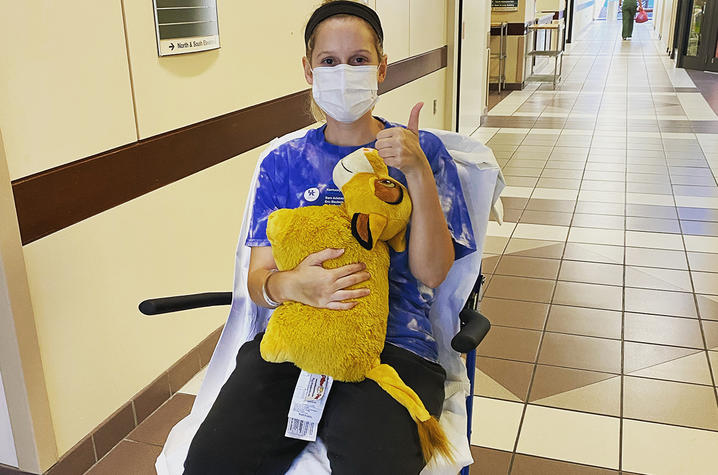UK Alumna Lyndsey Gough Documents Her COVID-19 Battle
LEXINGTON, Ky. (Aug. 21, 2020) — Lyndsey Gough, a University of Kentucky College of Communication and Information alumna, started out the 27th year of her life by having her world turned upside down.
The UK graduate had just celebrated her 27th birthday having a drink with friends, after she covered the RBC Heritage golf tournament with WTOC-TV, one of the first sporting events in the country held since March. Soon after, symptoms began.
Gough tested positive for COVID-19 on June 30 and seemed to be recovering well in isolation at home, when she began experiencing severe abdominal pain about a week later.
Hospitalized since July 9, UKNow caught up with the current multimedia journalist and weekend sports anchor in Savannah, Georgia, to talk about her journey battling COVID-19.
UKNow: What made you start documenting your journey with COVID on social media?
Gough: For starters, I live on social media. It is entertainment to me, so if I wasn’t tweeting during my time in the hospital, I’m not sure what I would be doing. But also, as a journalist, I have reported on COVID-19 for months and asked others to share their stories, so as far as transparency goes, I think it’s only fair that I share mine. My hope was that I could help someone by sharing my experience.
UKNow: When and how did you find out you were COVID positive?
Gough: My last day of work was June 20. I was fatigued, but thought it was from a crazy work week and slept on my days off not thinking too much of it. On June 23, I began really feeling the symptoms: body/muscle aches and chills, headache, loss of appetite, fatigue, night sweats, congestion, cough — everything BUT a fever and shortness of breath. I tried to get tested on the 25th, but they ran out of tests and I was finally able to be tested on the 26th of June. June 30th I got my positive results. After two weeks of quarantine, the flu-like symptoms returned along with abdomen pain. When I went to the emergency room on July 9, they re-tested me and I was still positive. During that time I also had emergency surgery. Ultimately, my surgeons tell me that the virus caused so much stress to my body that my appendix ruptured, and a host of other complications followed.
UKNow: Should people be taking the virus more seriously?
Gough: Absolutely. It is real. It’s not “just the flu” and it doesn’t just affect the elderly population or those with underlying health conditions.
UKNow: Have you learned anything from this experience?
Gough: Be careful — even more careful than you think you need to be, and never take your health for granted. I also learned that way more people cared about my journey than I ever thought possible, which is very humbling.
UKNow: What is your current job and how did UK help you get there?
Gough: Currently I’m a multimedia journalist and weekend sports anchor for WTOC-TV, the CBS affiliate in Savannah, Georgia. UK prepared me for the world of television journalism by giving us hands-on experience and putting us through actual news situations and scenarios. Also, covering the Cats as a student, I was covering world-class athletes early on in my career.
UKNow: Do you have any advice or words of wisdom for anyone reading this?
Gough: Take care of yourself as best possible, give yourself time to recover fully and grant yourself grace ... and go Cats!
Gough is now home and recovering from her post-emergency surgery after spending 11 days in the hospital. Keep up to date with her long road to recovery by following her on Twitter, @LGonTV, or on her Instagram, @lyndseygough.
As the state’s flagship, land-grant institution, the University of Kentucky exists to advance the Commonwealth. We do that by preparing the next generation of leaders — placing students at the heart of everything we do — and transforming the lives of Kentuckians through education, research and creative work, service and health care. We pride ourselves on being a catalyst for breakthroughs and a force for healing, a place where ingenuity unfolds. It's all made possible by our people — visionaries, disruptors and pioneers — who make up 200 academic programs, a $476.5 million research and development enterprise and a world-class medical center, all on one campus.







